#bc i study soviet history
Note
I've found a really good way that I come up with titles is start work at 8.30am, think about literally nothing but the fic for the next 8hrs (while getting no work done), finish work, edit the fic a bit, scream, edit the fic a bit more, realise the time, realise when I'm due to get up the next morning, scream again, pick a word at random from the fic by closing my eyes and danger-scrolling, google synonyms for the word, post the fic, and then think of nothing else but that one word for the rest of the night.
voila. bone apple teeth.
honestly valid 😭 screaming is a vital part of the titling process. my strategy is basically step 1: descriptive working title — i don't remember what it was for THD but my favourite is be gay do crime (the crime is treason) from a later section of my original fic series. step 2: basically your strategy, i.e. think about the fic while i'm supposed to be doing other stuff (in this case, marking papers) and hope something occurs to me. step 3: check if i have any title ideas written down somewhere (this is where THD's title comes from — I saw a post about this paradox and had it in the back of my mind as something that would make a good title). step 4: look up lists of unusual words to see if any of them are vaguely thematically relevant and then step 5: basic descriptive title of what the fic is about
#fic: the hedgehog's dilemma#asks#i'm probably going to call the series “Symbiosis” unless i think of something better#step 2 produced “the eternal recurrence of the same” and “what's past is prologue”#step 4 produced “emmetropia” (don't remember what that means) and step 5 produced “dragonslayers”#secret 6th step which is in-jokes with myself i.e. “the revolutionary potential of the peasantry” from the original fic series#bc i study soviet history#kvetch oc
10 notes
·
View notes
Text
Sunset Valley – The End of Days
Prologue
Sunset Valley, BC
River’s Journal – June 15th 1989
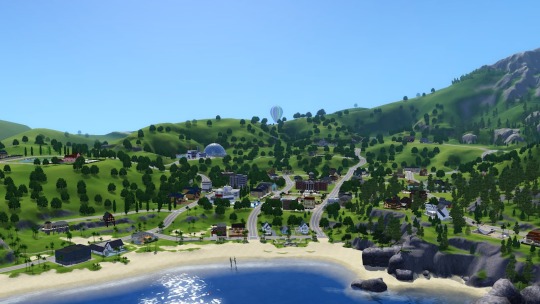
Today is one of the sunniest days we’ve had. Spring in British Columbia has always been a mixture of precipitation and rain. I don’t know what tomorrow will bring, but for right now, everything is right with the world – everything is as it should be. I’m now a young adult. Haruo turned young adult a year ago. And now the two of us are of the age of majority. Bebe turned young adult about six months ago and our lives are ahead of us. The three of us and Phil, Haruo’s friend, have always been tight, inseparable. Although Bebe tolerates Phil and Phil does everything to get on Bebe’s nerves, they’re still friends. And now Clarissa has entered the scene. She has been a boon for Phil as she tolerates his idiosyncrasies. I think they’re a match.

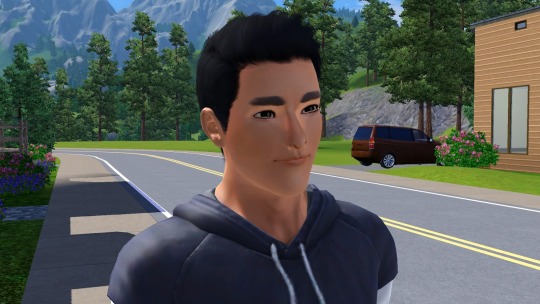
Meanwhile, Haruo, having been henpecked by his mother, has never really known what to do. Just recently, Haruo and I have decided to move to 5 Summerhill Court and that took a lot of convincing on my part, but I think he needed to be away from his mother – with some of the things he’s had to go through, I fear for his sanity. I don’t know how we managed to do it, but we have enough saved that we can put tents on a large sized property and start living our lives there as we earn enough money to make a success of ourselves.
But even so, we’ve heard so many disturbing things on the news. The Soviets have had yet another regime change. Since 1982 and the death of Brezhnev, we’ve had a string of Russian General Secretaries. Andropov lasted two years, then Konstantin Chernenko, now we have Mikhail Gorbachev who had led the Soviet Union to a point where there was a tenuous peace between the United States and the Warsaw Pact nations that were allied with the Soviet Union. Evidently according to my social studies teacher, who not only has been teaching us history, but also keeping us abreast of current news – we discussed many world events in class; the Soviet Union’s Politburo has been disgruntled over the fact that Gorbachev is making overtures to the West and it was nearing a tipping point. There was talk of a coup so the peace was very fragile and hung in a balance where the slightest event could tip it in a direction that was unwanted.
According to Haruo who also watched the news lately, he was of the opinion that the Soviets would probably topple Gorbachev and send us into a war that would quite possibly end humanity. I wish I could say that he was wrong. But growing up with his mother has left him with a severe case of complex PTSD and an outlook that is always pessimistic. He says that is the only way that he can protect himself. I wish there was something that I could do to help him.

Sometimes I feel as though world events sweep us a long in a tidal wave and we are helpless to stop it. I doubt that we as ordinary people can. World events are influenced by a few people in power whose motives we don’t understand and the rest of us are caught up in the ramifications of the decisions of the few. But since we have little influence over the things that bother the rest of the world, the only thing that we can do is to go about our daily lives and hope that the responsibility that we’ve given our world leaders is not for naught.
------------------------------------------------------
When I was in the White House, I was confronted with the challenge of the Cold War. Both the Soviet Union and I had 30,000 nuclear weapons that could destroy the entire earth and I had to maintain the peace. ~ Jimmy Carter
I remember fear and I remember the potential of nuclear war. ~ Jack Scalia
--------------------------------------------------
Decided to restart this fic mainly because of the fact that I ran squarely into a brick wall and my muse was NOT cooperating in the slightest.
#Sims 3 - End of Days#sims 3 stories#sims 3#ts3#river and haruo#river mcirish#haruo chikamori#sims 3 storytelling#sims 3 screenshots#Sims 3 Apocalypse#sims 3 gameplay#sims 3 simmer#the sims 3#thesims3#Sunset Valley - End of Days
5 notes
·
View notes
Note
4, 9, 17, 21, 25 - ☂️
4. Favourite historical era?
*sighing* guess I'm still 20th century bitches at heart for studying hmm. Right up to the early cold war,,, I'd say I'm more Europe Between Franz Ferdinand and Khrushchev? I keep coming back to the unparalleled terror and violence like a doomsday prophet i do. Keep coming back bc we are still reeling in many ways from the previous century, keep coming back because we are repeating the same mistakes even though they were committed close enough to the present that we should know better. Keep coming back to find loads ofblack comedy in the bleakest times bc there's nothing else you can do after all the fighting and warning and crying besides laughing.
For the Silly Goofies which is THE most important part of history actually, DEFINITELY Stalin-era Soviet and Early Modern - Modern Habsburg ((so like 1500-1700 Spain approximately, 1500-1914 approximately for HRE/Austria minus enlightenment. We unenlightened™ here that's why it's funny)). I did say black comedy.
Aesthetically I'm Rococo and then Baroque.
9. Favourite historical film?

You know this one. We all know this one. On the count of three. 1, 2, 3 tHE DEATH OF STALIN!!1!1!1!
17. What historical item would you like to own?
SIGH Philip II's Battle of St. Quentin armour bc of the historical significance of it being passed down from him to Charles II and the weight of a legacy and a romanticised one at that against a backdrop of the end of the line,,,,
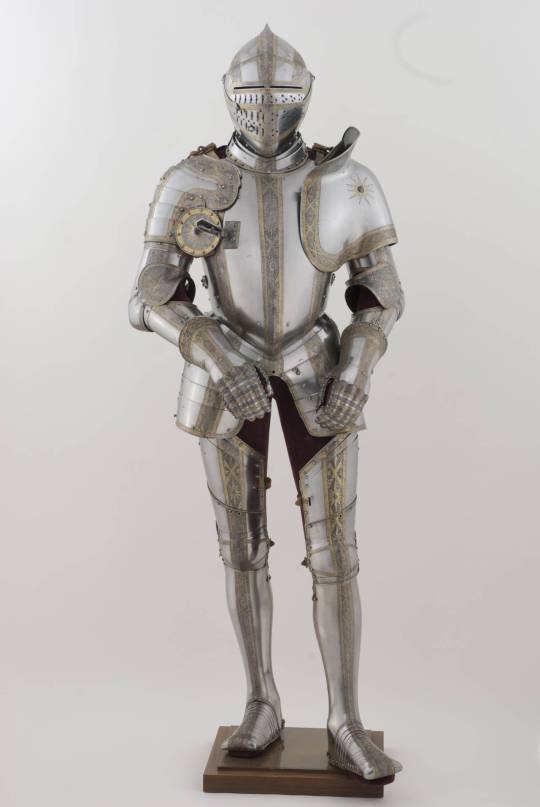
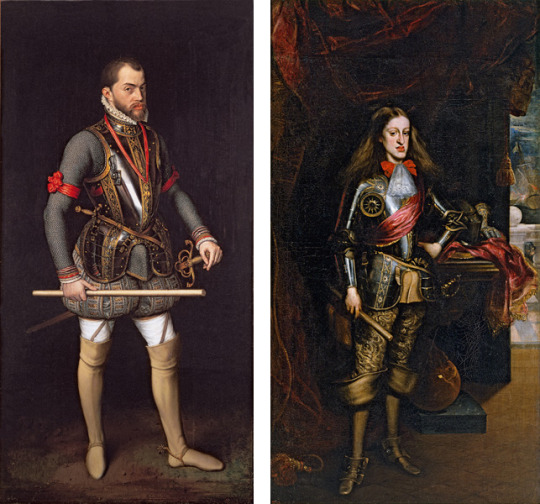
But most importantly ofc bc i know i could fit RIGHT into it and id enjoy that.
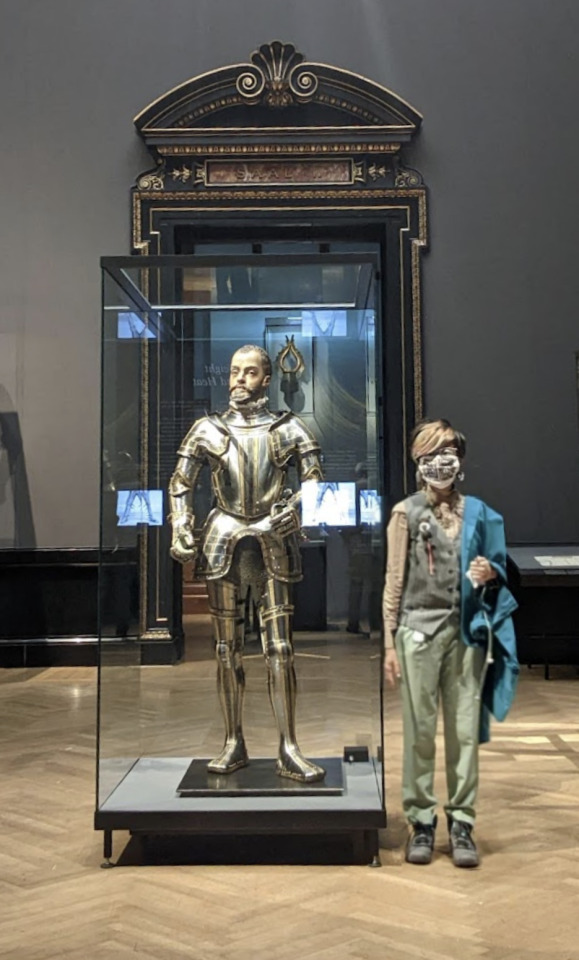
genuinely so embarrassing to be a manlet
21. What is your favourite history-based game?
This is so sad I don't play games >:3 I once saw a Twilight Struggle set in my college history class shelf and really wanted to play it but never got round to doing that. Does DnD with my shitty Habsburg based oc count?
25. Who is the most overrated historical figure, in your opinion?
Depending who I'm talking to & therefore what is pissing me off bc there are SO many overrated people to me ((Fr*nz J*seph, Elizabeth I, HENRY VIII FOR HELL'S SAKE, Louis XIV kill me!!1!1! Actually KILL ME!!)) but since I have been in MULTIPLE classes where the Protestant Reformation pops up. And had MULTIPLE Christian Kids™ fawn over his dumptruck arse with no shame. It's Martin Luther. Had to see his stupid face in my partner's slides on our presentation of the 80 Years War like miss girl pls u can just mention the Counter-Reformation briefly you didnt have to go into all that he's not gonna kiss you. Had to listen to a classmate go off about him for 5 minutes RIGHT after we established he was an anti-Semite too. Nightmare so it is.
#Actual answers/tldr are in pink this time bc i am going OFF#Thank you birb 🧩#Notes to the opera populaire#History#Re 17 i mean id like to attain franzi's bloodstained jacket too but first it serves no practical purpose and second Let The Boy Rest#Btw that photo of me w Philip's armour is not the st quentin one it's just a size comparison to demonstrate that i CAN fit into his armour#Re last one im saying this as a Protestant myself aight. Insufferable so it is
2 notes
·
View notes
Note
oppenheimer is actually a great movie. the acting, cinematography, score and overall production was outstanding. it really did american prometheus justice. i don’t see how this propaganda when it is literally just telling his story. was he a good man? that’s not for me to judge. is he a massive part of the history of physics? of course he is. he changed the game and as someone who is currently studying mathematics and physics i greatly appreciate what he’s done for my field of study.
Y’all have to be baiting at this point this is insane. Leave me the fuck alone dipshit. You ignored both of my recent and easily seen posts abt this bc you were so desperate to justify your guilty pleasure to me. Do you not see how much of a loser that makes you. Just bc the dinner guests wear a mask doesn’t mean you don’t share a table w fascists. And frankly you talking abt something that harmed so many ppl, from the downwinders, the ppl in Mexico that they tested on, to the citizens—not soldiers, citizens—that are still affected by what this piece of shit did in such a casual manner tells me everything I need to know. You don’t see this as a tragedy, not really. It’s just another note in the history book for you. You’re far more enamored a the pissing contest the US and Soviet Russia were having. Christopher Nolan had no right to sensationalize this story, and ESPECIALLY when he outright rejected to have any other direct input from anyone ACTUALLY affected by the bomb. And if I may say, this attitude screams white apathy. YOU weren’t affected, and the ppl who were are far away, so why should you care? You’re all falling for what was a very common fascist talking point t after the bomb; that the US did something bad but uhhh LOOK new science!!!!! Sweep under the rug all the nasty ways it came into existence!!! And LOOK!!! Japan was bad too, so they must have deserved it!!! Don’t worry about the fact that it was dropped on citizens who could not control what their armies and governments did, that there were entire schools worth of children horrifically killed!!!!
All of you leave me the fuck alone I’m done being nice abt it. You all are a bunch of bigoted idiots.
#kitty talks#kitty answers#I do t know why I even bother typing out a response bc I KNOW I’m talking to a goddamn brick wall.#god forbid you admit that you did something shitty.
3 notes
·
View notes
Note
Soo about art history! Well I studied a lot about applied art history - I really hope that's the right word but it's like furniture and stuff as well around architecture, sculpted and painted art (boii oh boi I really don't know the English terms sorry!!) And that was really interesting and I love learning more bc there's always so much more to know! I think my studies mainly focused on being able to put dates on art pieces and sort them into a time period - but also.. random funny artist stories my beloved XD Also for my thesis I had a look at Soviet war memorials so that's up my alley as well!
Hbu? Do you have any fav periods/genres/artists? :3
ooh applied art history sounds great! i wish my courses covered more architecture and practical crafts like furniture, it's pretty centered on painting and sculpture for the most part. and Soviet war memorials?? damn that's such a good topic, and hey hell yeah, congratulations on writing a thesis!!
and YES i do have favourites, putting it below a read-more sdkfgh:
RIGHT so my favourite movement is absolutely Impressionism, i love the depiction of light and the painting style of lots of small distinct brushstrokes is Such a wonderful effect. i'd have to say Claude Monet is one of my all time favourite artists, i especially love his sunsets:

Impression, Sunrise, 1872, oil on canvas, 48 × 63 cm, Musée Marmottan Monet, Paris
Also really like his snowy landscapes, and how he paints water, as well as his colour choices! it's not really displayed in these paintings, but in a lot of his more natural landscapes- especially the floral ones- the colours are so vibrant :D
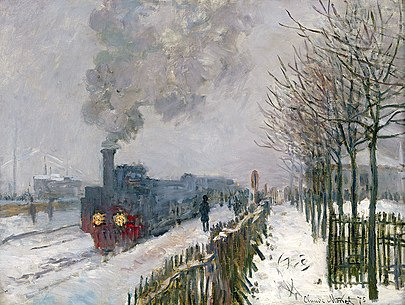
Train in the Snow, 1875, oil on canvas, 59 x 78cm, Musée Marmottan Monet, Paris
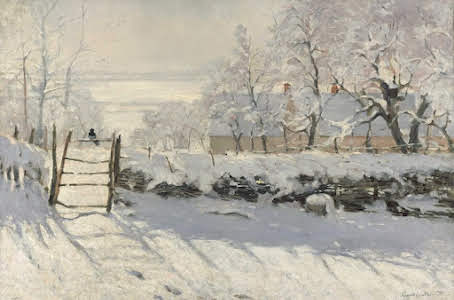
The Magpie, 1869, oil on canvas, 89 x 130cm, Musée d'Orsay, Paris

The Water Lily Pond (Nymphéas), 1904, oil on canvas, 90 x 92cm, private collection

The Bridge at Argenteuil, 1874, oil on canvas, 60.5 x 80cm, Musée d'Orsay, Paris
Similarly, I really like J.M.W. Turner, particularly for his dramatic seascapes and his paintings of ruins! Some favourites would be:

Fishermen at Sea/The Cholmeley Sea Piece, 1796, oil on canvas, 91.4 x 122.2cm, Tate Britain, London

The Burning of the Houses of Lords and Commons, 16th October, 1834, 1934, oil on canvas, 92 x 123cm, Philadelphia Museum of Art, Philadelphia

Melrose Abbey, 1822, pencil and watercolour on paper, 19.6 x 13.3cm, private collection
and these are some more things I've studied that I ended up really liking!
Edouard Manet: he was So controversial in nineteenth century Paris it's ridiculous, and i found it fun to look at all the layers of constructed identity in his works! Most well known for Olympia.

Chez le père Lathuille, 1879, oil on canvas, Musée des Beaux-Arts Tournai
Caravaggio: LOVE the horror and detail and drama of his works, third life enjoyers might like all the beheadings skjfhdg. highly recommend looking into this guy's life story and historical context because he. man. he sure was a character! it's also hilarious to read about how hated he was for painting in a naturalistic style. (and. the murder but honestly it seems like they hated his painting more)

Saint Jerome Writing, c. 1605-6, oil on canvas, 112 × 157 cm, Galleria Borghese (one of the tamest of his works skjdfh)
Hiroshige Utagawa and Katsushika Hokusai: had a unit on Japanese print making and !!! i hadn't known much about print as a medium but Holy Shit it's so versatile and the works by these artists are just stunning! want to look more into print for sure :D

Utagawa Hiroshige, Plum Garden, Kamata (Kamata no Umezono), in One Hundred Views of Edo, 1856–59, woodblock print, 34 x 24.1 cm, Brooklyn Museum
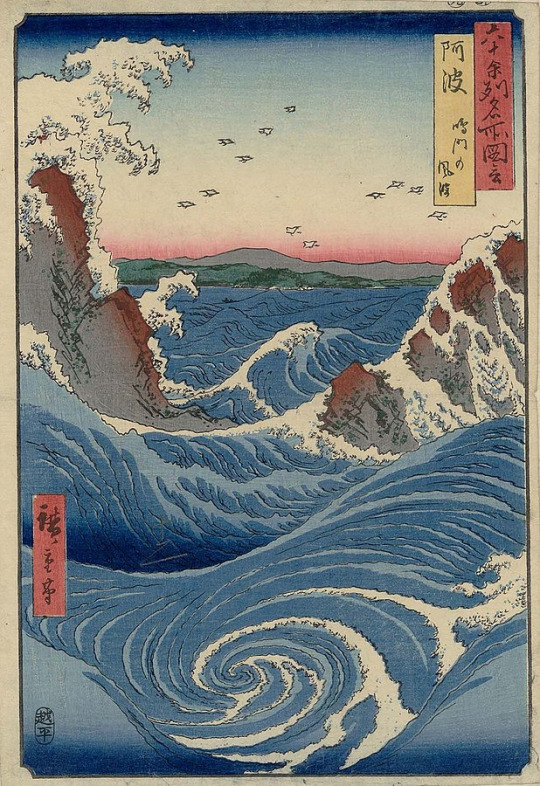
Awa Province: Naruto Whirlpools, in Famous Places in the Sixty-odd Provinces, 1855, woodblock print, 36.5 x 24.4 cm, Museum of Fine Arts, Boston
Hokusai made SO MUCH work but his most famous work by far is:

Katsushika Hokusai, Under the Wave Off Kanagawa, in Thirty-Six Views of Mount Fuji, woodblock print, 1830-1832, 25.7 x 37.8 cm, Metropolitan Museum of Art, New York City
Gothic architecture: haven't gone into much depth with architecture, really liked what i learnt though, and the round arches, ribbed vaults, and tall windows with stained glass are beautiful.

St. Francis Xavier Church, c. 1840, Amsterdam, Holland
and thank you so much for the ask!!! i'd love to hear more about anything art history related from you (or anyone else!), as specific or in depth as you like :D
4 notes
·
View notes
Note
Hi! Could I have the answers to 1, 15 and 25 please? 💛
hi lovely!!
1. Do you have freckles?
no, I wish I did though
15. What’s your favourite season?
spring :) I love everything beginning again and all the pretty flowers blooming. and I also like that it’s still cold but the sun is starting to come back out and it makes everywhere look so pretty
25. Favourite decade
okay so I’ve answered this and said 60s mainly bc i love history and studying it has been my life for the last four years lmao but if I had to pick my second favourite it would be the 80s bc the collapse of soviet communism literally fascinates me
0 notes
Text
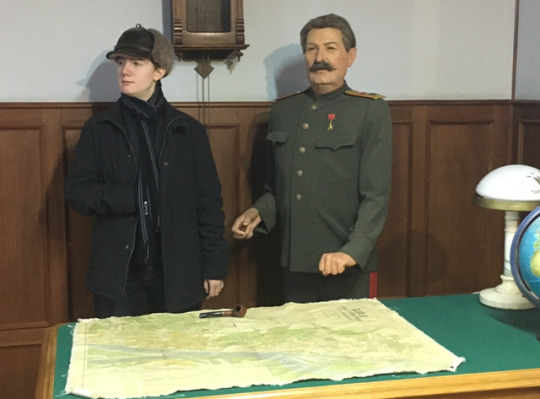
shocked and appalled to realize I never posted this here, but possibly the most On Brand image of me that exists is this picture my friend took of me with Joey Steel himself at the Volgograd Stalin Museum last semester
our tour guide in this establishment was an elderly lady who punctuated every point with a wooden sword and insisted vehemently that the subject of her lecture was an objective hero who did no wrong in his entire life; she also at one point gestured at me (with the sword) and informed the entire group “Stalin was actually quite small, much like this young man actually,” which is still possibly the most devastating comment about my stature to date. according to every source I’ve seen old joe was actually my height exactly so this image makes it clear they boosted their model up a little bit; truly the propaganda never ends
#I think I gained like 10 followers from that quiz so HERE YA GO... this is what I look like y'all should enjoy this#I can't be mad at the elderly stalinist she called me short but she was also very concerned that my coat was too thin#which it was; I have newfound sympathy for every soldier who talked abt how cold stalingrad was bc vogograd was the coldest I've ever been#this place isn't to be confused w the big stalin museum in georgia; it's like 3 rooms and probably wouldn't be open if it wasn't#right next to the stalingrad memorial complex#unrelated fun fact: I spent the entire semester being blisteringly in love w the friend that took this picture and never told him#thus the 3 most important facets of my person are all present here ie: study of soviet history; repressed homoeroticism; manlet status
2 notes
·
View notes
Text
@kitmarlowes dkjfkjgdhh We Are All Love Architecture
#st p has pretty architecture but apparently the climate is SHIT#i was initially kind of mad im studying abroad in moscow isntead of st p bc i wanted to history stalk vaslav nijinsky but now i get to histo#*history stalk all my soviet period faves#but i'll reserve judgement as to which is prettier until i've been there
1 note
·
View note
Note
Another question for ya: what's your favourite thing that you've written and why?
THIS IS SUCH A HARD ASK RAINBOW WHY
I have one unfinished Naruto fic that is ancient from when I was 17 (it was NaruHina bc I'm a basic bitch (◕‿◕)) haha I used to have it up on ffnet but I purged my accounts a few years ago so it now only resides in my hard drive. Even though it's old and probably now very good anymore, it will always have a special place in my heart for being what I wanted to write at the time and for all the positive feedback I got from it from my friends (someone even stole it to post it on orkut! *gasp*), it was a story about them being older and feeling out of place in a world they didn't think they fit anymore, which in retrospect was very telling of my 17-year-old self haha
But within Hetalia, I have not one, but a few favorites haha
The first one is an entry to the Kink Meme, the whole anonymous aspect of km to me was great because I wasn't very confident with my English yet and it allowed me opportunity to try new things without exposing myself too much if it turned out to be awful haha
It's a RusCan fill, a simple drunk pwp that I wanted to try a different drabble format of doing 100 words in the first paragraph, 90 in the second and so on until I reached 10 in the last. I'm pretty proud of how it turned out.
-
The second one is one that used to be up on lj, but now only lives in my hard drive as well haha It would have to go through a massive rewrite because there are SO many things wrong with it, from disconnected verb tenses to poor choice of words, but it also has a special place in my heart.
It was a character study for Belarus, and I spent a lot of time trying to make it concise and a little bit poetic because I wanted the segments of her history to flow like a memory.
Here's a part of it from the 90's and the fall of the Soviet Union (I had to clean it up a little before posting haha):
There was a crisis at the Kremlin, but she didn’t think much of it because there was always a crisis at the Kremlin. Except this time they entered their house during the night, took her brother to a psychiatric hospital, and said things would be different in the morning.
When she finally realized what was happening, her sister, Lithuania and everyone else had already gone away. Only Kazakhstan remained, sitting by the window of their shattered house.
He watched as she pulled on her coat and scarf and gloves. There wasn’t judgment in his eyes, no matter how much Belarus wished there were. It would be easier if he blamed her for not staying with her brother, but he didn’t, so it wasn’t.
Truth was, she didn’t want to be there when her brother came back.
She didn’t want another king or a tsar or a tyrant.
“Happy new year,” was the last thing she heard before the end of their Union.
It was also my first try at Kazakhstan who turned out to be one of my favorites from the Soviet block, and it made me enjoy Belarus as a character so much more. (I have A TON of problems with her canon version, Hima why do you hate women?)
-
I have a few Cold War RusAme drabbles that make me very proud of my younger 20 something self, which I reposted here.
I'm particularly proud of Winter of our discontent and Missiles on parade.
-
Of the new stuff I'm still riding the high of novelty, so I'd have to give them a few years to see what stands out, but I'm very proud of We meet in the middle and the drabble Cherish, I thought they came out nicely.
This was PAINFUL hahaha but thank you for the ask!
#this made me spend too much time in my old fic folder#;___; i'm emotional now#hetalia#rainbowfruitpastilles#oumaheroes
18 notes
·
View notes
Text
Why don't we learn about Ukraine's history in World War II-- For me and what I learned in school it was hardly on my radar that I remember. I don't even remember learning of it
How they were stuck between a rock and a hard place, really (like much of their history). They were being killed by the soviets then the Nazis came and some thought they might be liberators, coming from the West, at 1st but they killed and enslaved them...
I'm reading this in The Gates of Europe
I know we can't know every detail about all countries but. What happened there seems pretty significant. It's like World War II history from our education's perspective ends at the border of Poland. (And maybe they mention Nazi boots getting stuck outside Stalingrad or sth) Bc Ukraine was part of Societ Union? But its history is way more complicated than that (perhaps they think it's too complex for us to learn in an overview class... or it has to do with the remnant of a cold war mindset that sees all soviet countries as the same, or a broader western worldview which prioritizes western countries and sees the east as more "barbaric", Slavs as less "civilized" or something, less worth studying, which is the impression I get sometimes... what our culture's perspective seems in a way... idk I'm just trying to figure it out, thinking "aloud") In any case, we should at least learn some of it. Maybe we do and i dont remember
I'm trying to learn now. It's very interesting. And just 1 book of historical overview of entire country is of course just scratching the surface
#history#ukraine#world war ii#this western centric view annoys me sometimes#like studying western civilization..#its kind of made up#we do believe in certain ideals. but no . country has a monopoly on truth or right etc#no "civilization#world history in college studied all#but not ukraine#that i remember#except maybe as a footnote#in overview u cant study all#u have to narrow in and study like 1 area#to know it decently#but. why cant i know all#to write#to know#to do#help....#all#sigh
5 notes
·
View notes
Text
my politics professor thought I was really well informed on Soviet maneuvers during Brezhnev but actually it was bc I listened to We Didn’t Start The Fire a lot to study during AP us history
6 notes
·
View notes
Note
Hi 🤗 you said eastern europe and slavic history right? So what parts do you like? What people or events or times etc? Thanks and have a wonderful rest of the weekend 😋😎
Hiya!! 😁
I did my BA in slavistics, so more the philological direction, but now im doing my master’s in slavistics and a curriculum called interdisciplinary eastern european studies which combines slavistics with history and and sociology :) but the rona made me extremely slow in my uni progress so I’m not exactly well versed on the history aspect yet 😅
But yeah, my focus is the western slavs, mainly Czechia, and the periods there im most interested in are probably the soviet period and the old old middle ages with the legends :) i’m doing a third master’s in gender studies (because i am insane) and am particularly interested in gender dynamics in eastern europe and the lgbt issue.
what i find very interesting is the czech founding myth revolving around the magical woman libuše, mother of the people so to speak, who as the men demanded not to be ruled over by a woman anymore, gathered her amazons and fought women against men in what is called the maidens war. the men won for different reasons in different retellings, but it was always a dishonorable ambush. i mean, the power. actually considering to analyze several retellings of that story and find out its meaning for gender dynamics for my thesis in literary science but who knows when that will ever happen haha
a big thing for me is also the perception of eastern europe in the west. i was actually born in czechia even tho i grew up in austria and i mean i noticed how people treat and treated my mother and what reactions i get sometimes, despite having no accent and the most austrian last name imaginable. like, half the population of viennese people that have lived here for generations has czech heritage and names bc we were in the same monarchy for quite a fucking while lol, and czechia is, as slovakia, extremely close to vienna. but since the iron curtain that feeling of neighbourdom has really died. what i’m trying to say is despite this shared history the last century and capitalist narrative has merged all of eastern europe into this big ball of “lol theyre just poor backward people what is there to expect after decades of CoMmUnIsM” to hide the fact why theyre actually economically struggling is The West Exploiting Them With Capitalism (e.g. talking about how poor romania is while exploiting their most important resources —> the forests and corrupt politicians being like yeah sure friend!) while demonizing eastern european immigrants and then wondering why eastern europe doesnt really care about cooperating with the west anymore. not to get carried away but this is a huge huge thing i’m also very interested in.
I hope i gave a satisfying answer AT ALL haha,
a wonderful sunday to you!! 💕
5 notes
·
View notes
Note
Yo as someone who studied politics and was raised by people who got degrees in politics and Soviet studies I also wish people would realize that basically all the American words for where you are on the political spectrum is based upon an American perspective of the political spectrum. Communism in theory is very different than the real life examples we have and it’s no wonder that people from those countries are so against going back to that. People need to realize that the goal is not total communism right now. It’s getting America back on track. We had a ton of decent social programs before Reagan. But he gutted them and combined with the propaganda of the red scare we’ve been stuck since then. Politics is so reliant upon culture and history and to act like a word has the same connotations in a place with a completely different history is so ignorant. (Not to mention that if we want American liberals to stop it we probably shouldn’t be antagonizing them bc then why would they have any reason to listen?)
yes exactly thank you so much!!!!!! i dont even have anything to add like. yeah this exactly
20 notes
·
View notes
Note
Hello! i sent you russian recs before and i hope they helped you! this is like the first time i see someone be so enthusiastic about learning russian, im sure your mom will come around and if not the most important thing is what makes you happy, i hope you're feeling better
Утро is so good!! im so glad you liked it! 🥺 and i got more for you
Кино is a legendary band, even though I'm not that big of a fan, you might like some of their songs
there are bands that are generally well-known, like Нервы (i think some of the most popular songs are Самый дорогой человек and Слишком влюблен) and Би-2 (they're not necessarily in the same category though)
the hatters have some good songs but im not sure which ones really to recommend tbh, maybe Танцы or Да, со мной не просто, they're pretty funky
Аффинаж have a unique sound id say, i recommend their songs Солнце and Звездолет
some random songs from my playlist: Черные очки by Комсомольск, Молчи by кис-кис, Не спеши performed by Анна Герман (or Муслим Магомаев, his version is very beautiful too)
also i recently revisited some artists that were popular way back then, so if you want a song to be super sad to Бесполезно by Валентин Стрыкало is perfect
lastly seeing that you like Аквариум id recommend checking out songs from old soviet movies, they all unlock never before known emotions, songs like Нежность, Со мною вот что происходит, Последняя поэма
this is kind of all over the place i apologize hsjakam
Good luck with your studies btw!!!! you're doing great from what i saw on your blog <3
hi !!! i know this is literally months late but i was keeping it bc i wanted to listen to the songs in moments of crisis TM to keep me warm ! that sounds so silly but like the romanticism of listening to new songs recommended by a stranger askdjfh thank you so so much for these !!! i’ll tell you what i think of each of therm !
Кино - theyre not necessarily my style either but Бездельник (the first one) is so good honestly !! i think theyre one of those bands you have to listen to the whole discography of to get to the hidden gems sdhf also i read some of their history and Oh My God ok i get why theyre legendary now sdkhd
Нервы - this isn’t really my style :( i think the voice is too nasally ? idk it’s just not my thing but i can see how it would be appealing !!
Би-2 - sort of similar to Кино sdhds like they have some really good things but not a lot which makes me think i have to go through their songs and find the rly good things !!
the hatters - Танцы sounds like it has great music video potential omg it almost reminds me of caravan palace by lone digger ? same vibes ksdhf . со мной не просто is rly good i genuinely like this one !!! it has supervillain vibes in the best way !! it cheered me up a bit :) it’s so upbeat
Аффинаж - the intro for Солнце is so good + it’s so atmospheric !! the lyrics are so poetic too !! Звездолет too !! it has poetically dystopian vibes sdkhf i think in terms of actual sound and lyrics they’re really good !! the неееееебо плечом задев на землю просыпал снег ~ и еееей на снегу пишу - то, что, боюсь, не скажу bit is physically healing me for some reason sdjfj ill add this to my playlist !
Черные очки by Комсомольск - i genuinely dont know why this hits but it does !!!
Молчи by кис-кис - this is very sad and the lyrics are so well written but it also sounds ,, politically charged ? it kind of sounds like what the youth people in my country would sing if they were allowed musical freedom idk how to explain it sjdf
Не спеши makes me wants to dance in the kitchen tenderly with a lover at midnight with it on a record player asjdhf i am having feelings !!
Бесполезно by Валентин Стрыкало - i actually listened to this before ?? omg i didnt realise sdhf i have it saved !! but anyway без меня всё будет так же так же как со мной осколки звёзд сорвутся с неба и исчезнут king im going to cry valentin did that <3 valentin strykalo handshake claude debussy : beat drops !
also this is completely absurd but im listening to Последняя поэма as im typing this and i dont know why but im literally in tears !! like physically i am crying maybe its pent up emotions ?? either way i just ,, im feeling things dkshf its os gentle i want to tell this song “thanks for the hug”
thank you so so so so so so so much for everything !!!! im sorry i was so late w responding :(( i love asks like this so much !!! i appreciate it a lot :)
#kings am i allowed to extend words like that in russian or is that . not a thing dkjfh#aks#anon#thank you so so much for this !!#i hope ur doing ok !! feel free to send me more recs / aks if you want !#Anonymous
10 notes
·
View notes
Note
Don’t be shy tell us what the rusger fic is about
// Human AU in the 1930s
// Some history about the whole premise. Germany makes a secret pact with Soviet Russia so that both countries can study tanks (Germany is basically crippled by the treaty of Versailles so they can’t do study or testing of tanks in Germany and Soviet Russia doesnt have the funds to study tanks). So a tank school is built in Russia (Kama Tank School).
// Ludwig applies to go study at the tank school, he gets accepted and leaves for Russia. (Idk whether to make him an engineer or tank officer)
// Ivan does the same and becomes a student of the tank school. They become partners. There are some language barriers among the rest of the students but Ivan already knows a good amount of german so they doesn’t need a personal translator.
// The sketch I posted, if you didn’t notice but Ludwig is wearing a Soviet uniform bc the German students had to disguise themselves as Soviet soldiers so Britain and France wouldn’t notice.
// blah blah they become friends (idk if I want them to become romantic. Maybe some tension?)
// blah blah Ludwig dies at the end lol
// Well they both die at the end lmao
6 notes
·
View notes
Link
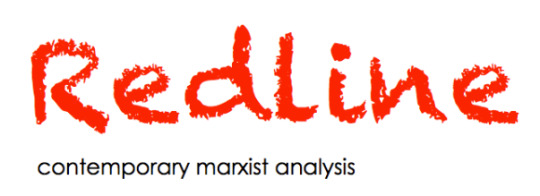
New Zealand schools have introduced a climate change resource that suggests children “eat less meat and dairy”, even though teachers will not know how much meat or dairy any child in their care has eaten. Opinion pieces in the papers have called for the reduction of meat and dairy in hospital menus, not usually generous sources of such foods, despite the well-known risks of undernutrition, especially of protein, in the frail and elderly. Globally, the influential and once-objective medical journal the Lancet has hosted Eat Lancet, a coalition of vegan and vegetarian technocrats backed by processed food manufacturers, and promoted their agenda. The Guardian newspaper accepted an £626783 grant from the backers of Impossible Foods to run a series of articles against animal agriculture.
These initiatives, aimed at remodelling our food supply in a way that favours the multinational food processing and seed-and-chemical corporations, whose control of many aspects of farming and diet is already problematic, have run far ahead of the scientific community’s efforts to understand the health effects of such dietary change.
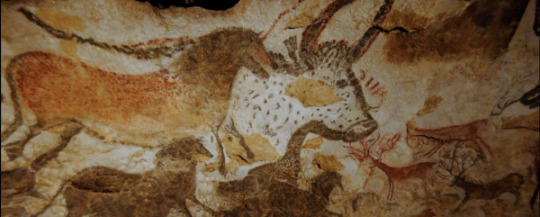
Our hunter-gatherer past
The Neolithic Revolution was the first alteration in human affairs that is generally considered worthy of the term Revolution. In Marx’s terms, it saw a change in the means of production sufficient to form new classes aware of their identities, and thus a change in the relations between people. Early humans had fed themselves in an opportunistic, hunter-gatherer fashion that tended to favour a diet of animals supplemented with plants where and when these were available. Large animals made the best meals but gathering activities could collect many smaller ones, as well as eggs, grubs etc.
The people of the Mesolithic era discovered that some animals could be herded and some plants grown in gardens (not usually by the same community, because one activity favours nomadism and the other favours a sedentary habit) but these activities, which greatly improved food security after the decline of the prehistoric mega-fauna due to hunting and climate pressures, tended to occur at the communal level and probably did not create major class differences between the people involved.

The invention of farming
The Neolithic Revolution, which unleashed the human potential for war, creativity, and social division, resulted from the identification of the germs of plants (specifically grains and legumes) as durable sources of energy. If grains were grown (I will use grains in the wider sense of “cereals”, after Braudel, including other dried germs such as peas) and there was a surplus, this surplus would still be edible over the next year, a year when drought or pests or diseases might wipe out the other food sources that hunter-gatherers depended on. This advantage was offset by the nutritional poverty of grain-based diets, so that tuberculosis probably became an endemic disease during this period,[1] but the existence of a less-perishable surplus allowed the diversion of part of the population away from food gathering for large parts of the year, and saw the creation of armies and other workforces.
In Europe, the Neolithic Revolution is dated at around 10,000 BC and its arrangements are a matter of prehistory, but in China this change occurred later and the written record around Bi-gu or grain avoidance includes folk-memories of conflict between grain eating and grain avoiding peoples.
The history of colonisation is the history of the conquest of lactose-intolerant peoples by lactose-tolerant populations, and of non-grain eaters by grain-eaters. In the Indian sub-continent, a combination of dairy herding and a cereal diet high in legumes uniquely allowed the survival of a substantially vegetarian population, and saw the conservation of genes favouring reproduction on such a diet, including genetic polymorphisms still rare in European populations (adaptive mutations only predominate where many individuals without them have failed to survive or reproduce).[2] That the Indian social system became more aggressively class-based than any other is probably no co-incidence; prejudice against meat-eating is still used as a tool of social control against minorities, while meat-eating is one way young Indians today identify as modern and egalitarian. However there were some important exceptions to the trend – the Aztecs were a hunter-gather people who conquered and dominated the Mesolithic agriculturalists of Mexico, and the Mongols were nomadic herders and hunters whose greater stamina and independence allowed them to defeat the rice-fed armies of the Chinese Emperors (after conquering this breadbasket, the successive Mongol Khans seem to have eaten and drunk themselves to death).
Early vegetarian ideology
In the European and Asian cereal-based societies the poorest classes went without meat, supplementing cereals when possible with buttermilk or blood pudding which were more economic replacements. The rich ate as much meat as they could. The idea that an entire society might avoid meat is a recent one with its roots in religious practice, and, insofar as it has any political basis, this flows in two distinct streams – the eco-fascist, in which meat avoidance is a sign of “purity”, most humans are a burden on the Earth, and the Indian vegetarians are of course Aryans. This is something like the vegetarian vision that Adolf Hitler picked up while studying anti-Semitism with Wagner’s heirs at Bayreuth.
And then there is a Marxist-Anarchist, and latterly Intersectional, version, founded on a valuation of animal rights as inseparable from, and a logical extension of, human rights. Vegetarianism was a frequent obsession of the early British Socialists; G.B. Shaw, who derived most of his energy from dairy fat and lived to the age of 94, made himself into a well-known example, and the idea was sufficiently entrenched among the British Socialists and their milieu that H.G. Wells preserved its internal contradictions for posterity in The Time Machine. In his far-future vision, humanity has evolved into two separate species. The Morlocks are descendants of working-class meat-eaters, the Eloi of leisure-class vegetarians – all Wells’ loathing is reserved for the Morlocks, yet it is obvious they are (still) the engineering brains keeping their world running and the Eloi fed. The Eloi are useless for anything but enjoying the sunshine and feeding the Morlocks, and the discordance in Wells’ progressive values as he describes both species is as shocking as anything else in the story.
The first large-scale experiment in plant-based protein was attempted by the Bolsheviks. As usual, it’s hard to separate the roles played by idealism and cynicism in the story, but the bare bones are that the Soviets found their initial attempts to remodel the countryside rebuffed, blamed this on the recaltricance of the kulak class, and set out to destroy them. The problem being that the kulaks, owning most of the cattle and sheep across the Russian Republics, helped to feed the people. Beginning in the 1920s, soy experts from the USA (then the Western world’s leading soy producer) were among the many foreign technicians imported into Russia, and soy processing plants were built and soy production increased to 283,000 tonnes in 1931, the year Stalin unleashed enforced collectivisation and the terror against the kulaks (and also the Kazakhs, a herding people who suffered the largest proportionate loss of life during this period). This led to the loss of millions of animals, either killed by their dispossessed owners or mismanaged by their inexperienced new owners. The soy project was hardly able to prevent the massive famines that followed, and by 1935 soy production had dropped to 54,000 tonnes. Though soy milk would later prove useful during the siege of Leningrad, by the 1930s soy had probably only served one purpose, as a statistic needed aforehand to quell the objections of pragmatic delegates to the destruction of the kulaks and their livestock.
Today we face the revival of this idea, of plant protein that will create a world with no need for animal protein, and the remodelling of life in the countryside, with the new impetus of climate change as its driver. Livestock cycles natural carbon, meaning there is no net addition of C02 to the atmosphere – and its contribution to the shorter-lived methane precursor has not changed since 2000 (methane rises have been due to fracking, methane itself AKA “natural gas”, landfill, and rice production; methane-emitting animals have always existed on Earth in substantial numbers, and have not created a novel situation in the sense that the discovery of coal, oil and gas did). We have recently seen how much global disruption is required to reduce fossil fuel CO2 emissions to 2006 levels, levels which will still warm the planet if they continue. It could be still be worth reducing agricultural cycling of CO2 through methane, which is more warming than CO2 if this is cost-free, but is it?
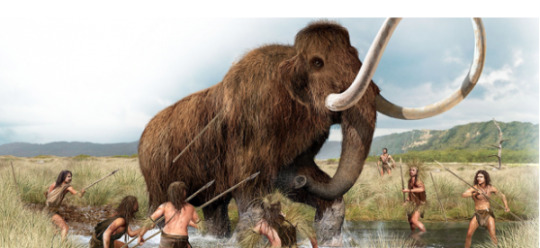
Why humans evolved as meat eaters
Animal foods, and especially red meat, supply a constellation of nutrients not found together (if they are found at all) in any plant food. Nutrients are those chemicals essential for the functioning of the human organism, and plants, but not livestock, can survive well without nutrients such as amino acids, fatty acids, vitamins and minerals that are essential to humans. Surviving as a vegetarian or vegan is possible for some (perhaps assuming the genetic variants referred to earlier are present) but to thrive requires knowledge of these nutrients, where to find them, how to process the foods that supply them, or how to supplement them. Thriving as an omnivore or even a complete carnivore does not – nutritional sufficiency is the reason we evolved eating meat and other animal foods long before we learned there were such things as essential nutrients.
The reasons for avoiding meat or all animal foods can have a class basis – veganism may be taken up by educated middle-class adults, more likely to be exposed to “health food” ideas and aware of the need to supplement, some of whom then commercialise their habits as social media “influencers”. Meat avoidance is also being adopted increasingly by educated middle-class children for identity or compassionate reasons, but the poor may also avoid meat because of its cost when a loaf of bread or a packet of flavoured noodles can be bought for a dollar; these two motivations sometimes coincide when students in temporary poverty make a virtue of what they perceive to be a necessity.
Does the meat-avoiding behaviour of young people have unintended costs? Several observational studies have looked at the characteristics of meat-avoiding populations and found alarming increases in depression, anxiety and self-harm.
“The majority of studies, and especially the higher quality studies, showed that those who avoided meat consumption had significantly higher rates or risk of depression, anxiety, and/or self-harm behaviors. There was mixed evidence for temporal relations, but study designs and a lack of rigor precluded inferences of causal relations. Our study does not support meat avoidance as a strategy to benefit psychological health.”[3]
How can we explain these correlations? Why should we assume that they are causal?There are several lines of evidence to support a causal link:
1) several nutrients found in meat and animal foods are important factors in mood and cognition; vitamin B12, iron, carnitine, DHA, choline and tryptophan are some examples.[4]
2) the fatty acid mix in dairy and red meat has a similar composition to that of amniotic fluid and breast milk which has anxiolytic (anti-anxiety) effects in young animals.[5]
3) soy is a convenient and cheap replacement for animal protein; soy processing in Western diets results in a 10-fold higher level of the estrogenic contaminant isoflavone than that found in Asian diets.[6] Soy isoflavone causes anxiety behaviour in young female animals, and there is evidence supporting psychotropic and hormonal effects in humans.[7,8,9.10] Interestingly, while right-wing critiques of soy eating focus on effects it can have on young men, the scientific evidence for adverse effects in younger females, converting to HRT-like benefits after menopause, is stronger.[11]
4) other toxins found in plants, such as salicylates and oxalates, as well as problematic proteins such as gliadin/gluten and zein, may be present at higher levels in meat-free diets (but are not unique to them). A vegan mince sold in Countdown supermarkets is simply a coloured blend of soy protein and gluten, a protein linked to the risk of schizophrenia.[12]
In the New Zealand context it would be relatively easy to confirm or dispute some of these associations. Everyone admitted to hospital for longer than a day supplies their dietary preferences. The dietetic preference data from psychiatric admissions could be both linked to outcomes over time and compared with the population average distribution, or the distribution in a ward where diet is least likely to play a role in admissions.
Iron deficiency in women
Young women in New Zealand are the most likely to report being vegan or vegetarian in surveys, as elsewhere in the world. Vegans in the Gender Studies field generate papers linking meat to masculinity, with the implication that this masculinity is toxic and might be improved by a plant-based diet.[13] The corollary of this belief – that women may therefore be weakened by meat-avoidance – is never considered. In a 1980 essay by Gloria Steinem called The Politics of Food (in the collection Outrageous Acts and Everyday Rebellions) she describes some of the cultural constructs by which women are deprived of the good nutrition which men use to stay dominant. The belief that men need to eat red meat more often than women may have been valid when the average man was more likely to have to survive an attack by a wild bear than the average woman, but today it is mainly women who suffer from serious iron deficiency. The rate – and the cost to the health system – is increasing in New Zealand as more women give up meat. Iron deficiency anaemia in early pregnancy is associated with neurodevelopmental disorders in children, not an outcome that will increase the mother’s autonomy.[14]
In Georg Büchner’s 19th century “working class tragedy” Woyzeck, filmed by Werner Herzog with Klaus Kinski in the leading role and the subject of an opera by Alban Berg, the title character, a soldier, is subject to experimentation by a sadistic army doctor. The experiment involves Woyzeck living on nothing but peas. Peas may supply a complete protein, but Woyzeck goes insane; the deprivation being the final straw in his alienation. James Cameron, the film-maker responsible for Avatar and Titanic, is investing heavily in pea protein as if this were his gift to New Zealand. I am not sure whether he has watched Woyzeck – one would think he has.
Plant-based vs meat-based
Again, we have the specificity of plant germs as commodity; their low cost of production, long storage life and versatility of processing outcomes makes them an ideal investment and a robust one, as poverty and adversity increases their consumption, as we saw during the 2020 Lockdown Event. However, a plant-based burger is nutritionally greatly inferior to a meat burger, and that burger is often the most nutritious single food item many will people eat in the course of their day. The current push to eat a plant-based diet for “planetary health” is something that all the multinational food processors have signed up and provided funding for, and why not – Coca Cola, Unilever, Nestlé have always sold us plant-based foods. We notice that while iron-deficiency anaemia increases in New Zealand with the reason in plain sight, Nestlé scientists here in NZ are developing a more potent form of supplemental iron to add value to their products as their parent company backs the push to reduce meat. (As usual, it’s hard to separate the roles played by idealism and cynicism in the story).
But, you may well ask, isn’t eating meat linked to an increased risk of cancer and heart disease? These associations are small to begin with, but they are also intensely confounded by social class and educational status. Supposing a factory that makes a carcinogenic chemical is hiring. Who is more likely to apply for that job – a meat eater (who will likely have a bigger family to support, among other considerations) or a vegan? Who, so to speak, eats all the pies, and needs food that is filling and nutritious without having to give it much thought? Who is more likely to work two jobs and be exposed to the disruptive metabolic effect of shift work? Carcinogen exposure and shift work are just two of the confounding variables ignored in diet epidemiology. (That meat-eating in Western populations may symbolise or associate with labour itself – as it did for H.G. Wells when he wrote The Time Machine – is not a consideration I have found discussed in the epidemiological literature.)
Certainly one can think of mechanisms that might link meat to disease, as one can with any food, but one can also think of protective mechanisms; several of the nutrients found mainly or only in animal foods are required for various antioxidant and immune defensive enzymes, and some like carnitine and EPA even have a place in the management of heart disease.
The argument against meat-eating should not be confused with the argument for sometimes rationing a valuable food that is in short supply. The wartime rationing of meat in the UK is thought to have improved the health of the poorest by guaranteeing a greater supply than they had had previously, at a more affordable price. In Europe, the peasants who supplied the cities with meat, dairy and luxury foods such as oysters were sometimes forced by network disruptions to consume these foods – which many of them had never tasted before – with benefit to their own health.
The plant-based agenda can scarcely be expected to recognise these benefits, or understand the argument summarised by Williams and Dunbar (with regard to the vitamin nicotinamide and amino acid tryptophan in their tuberculosis paper), that if better data collection and analysis resulted in us ”…returning to our egalitarian past and redistributing meat or its components that supply NAD (avoiding both the highs and the lows between individuals and over individual lifetimes) [this] may be more effective than subsidizing corn grain (while the increased prosperity from unlocking human potential should pay for the intervention).”[1]
Progress – which includes unlocking human potential from the chains of preventable mental and physical disease – depends on good data, and we do not yet seem to collate the data required to know whether or for whom plant-based diets are safe in New Zealand.
George Henderson works as a researcher for Professor Grant Schofield and the team behind the What The Fat books and the social enterprise PreKure, which has been running free lifestyle and health programs through the lockdown. He is the author or co-author of several scientific articles and letters published by the BMJ, Lancet Diabetes and Endocrinology, the JAMA, and other journals, including an influential review of low carbohydrate diets in diabetes management for the New Zealand Medical Journal. A musician, songwriter and amateur musicologist, he has recently presented a series of podcasts on 20th century women composers for Karyn Hay’s Lately show on RNZ.
References:
[1] Williams AC, Dunbar RI. Big brains, meat, tuberculosis, and the nicotinamide switches: co-evolutionary relationships with modern repercussions?. Int J Tryptophan Res. 2013;6:73‐88. Published 2013 Oct 15. doi:10.4137/IJTR.S12838
[2] Kothapalli KS, Ye K, Gadgil MS, et al. Positive Selection on a Regulatory Insertion-Deletion Polymorphism in FADS2 Influences Apparent Endogenous Synthesis of Arachidonic Acid. Mol Biol Evol. 2016;33(7):1726‐1739. doi:10.1093/molbev/msw049
[3] Urska Dobersek, Gabrielle Wy, Joshua Adkins, Sydney Altmeyer, Kaitlin Krout, Carl J. Lavie & Edward Archer (2020) Meat and mental health: a systematic review of meat abstention and depression, anxiety, and related phenomena, Critical Reviews in Food Science and Nutrition, DOI: 10.1080/10408398.2020.1741505
[4] Frédéric Leroy & Nathan Cofnas (2019) Should dietary guidelines recommend low red meat intake?, Critical Reviews in Food Science and Nutrition, DOI: 10.1080/10408398.2019.1657063
[5] Contreras CM, Rodríguez-Landa JF, García-Ríos RI, Cueto-Escobedo J, Guillen-Ruiz G, Bernal-Morales B. Myristic acid produces anxiolytic-like effects in Wistar rats in the elevated plus maze. Biomed Res Int. 2014;2014:492141. doi:10.1155/2014/492141
[6] Fernandez-Lopez A, Lamothe V, Delample M, Denayrolles M, Bennetau-Pelissero C. Removing isoflavones from modern soyfood: Why and how?. Food Chem. 2016;210:286‐294. doi:10.1016/j.foodchem.2016.04.126
[7] Hicks KD, Sullivan AW, Cao J, Sluzas E, Rebuli M, Patisaul HB. Interaction of bisphenol A (BPA) and soy phytoestrogens on sexually dimorphic sociosexual behaviors in male and female rats. Horm Behav. 2016;84:121‐126. doi:10.1016/j.yhbeh.2016.06.010
[8] Tillett T. Full of beans? Early soy exposure associated with less feminine play in girls [published correction appears in Environ Health Perspect. 2012 Jan;120(1):A17]. Environ Health Perspect. 2011;119(12):A525. doi:10.1289/ehp.119-a525b
[9] Adgent MA, Daniels JL, Rogan WJ, et al. Early-life soy exposure and age at menarche. Paediatr Perinat Epidemiol. 2012;26(2):163‐175. doi:10.1111/j.1365-3016.2011.01244.x
[10] Hibbeln, J.R., SanGiovanni, J.P., Golding, J., Emmett, P.M., Northstone, K., Davis, J.M., Schuckit, M. and Heron, J. (2017), Meat Consumption During Pregnancy and Substance Misuse Among Adolescent Offspring: Stratification of TCN2 Genetic Variants. Alcohol Clin Exp Res, 41: 1928-1937. doi:10.1111/acer.13494
[11] Patisaul HB, Jefferson W. The pros and cons of phytoestrogens. Front Neuroendocrinol. 2010;31(4):400‐419. doi:10.1016/j.yfrne.2010.03.003
[12] Čiháková D, Eaton WW, Talor MV, et al. Gliadin-related antibodies in schizophrenia. Schizophr Res. 2018;195:585‐586. doi:10.1016/j.schres.2017.08.051
[13] Jessica Greenebaum & Brandon Dexter (2018) Vegan men and hybrid masculinity, Journal of Gender Studies, 27:6, 637-648, DOI: 10.1080/09589236.2017.1287064
[14] Wiegersma AM, Dalman C, Lee BK, Karlsson H, Gardner RM. Association of Prenatal Maternal Anemia With Neurodevelopmental Disorders. JAMA Psychiatry. 2019;76(12):1294–1304. doi:10.1001/jamapsychiatry.2019.2309
3 notes
·
View notes